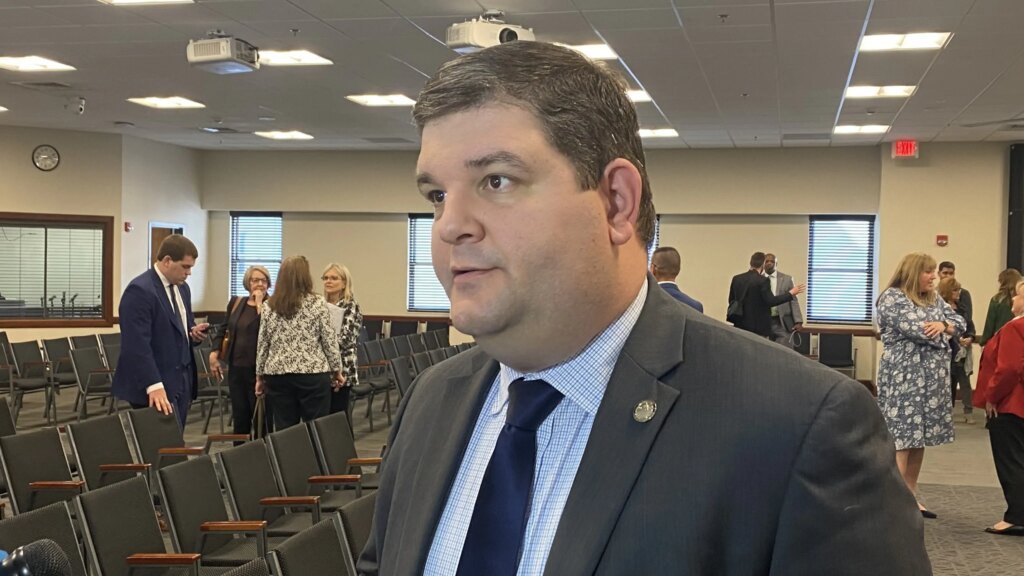Legislation on Death Penalty for Child Sexual Abuse Discussed
During a media appearance on Monday, Matt Simpson, the state representative from R-Daphne, talked about efforts to reshape legal precedents surrounding the death penalty.
Simpson has been collaborating with state Senator R-Brierfield on proposed legislation for the 2026 session that would permit the death penalty in cases of sexual abuse involving children under 12.
In his discussion on FM Talk 1065’s “The Jeff Poor Show,” Simpson noted the increasing support among Republicans for this bill. He expressed that if it passes, it could significantly alter the criteria for imposing the death penalty without actually leading to executions.
He mentioned the ongoing cooperation with Senator Weaver on this legislation. Recently, this partnership stemmed from a crime investigation in Bibb County that resulted in multiple arrests related to child sexual abuse and human trafficking. Eight suspects faced charges as a result of this inquiry.
Simpson had introduced similar legislation in the 2025 session, which gained approval in the House but failed to pass in the Senate.
“I was always planning to refine it this year to see if we could make progress,” he commented about the bill. “Senator Weaver reached out after the Bibb County incidents and said, ‘We really need to tackle this issue. How can we address this?'”
He expressed admiration for her collaborative spirit, indicating that it’s essential for the bill’s advancement.
Simpson feels that there is more widespread public backing from Republicans this time compared to previous sessions.
“I think we’re building momentum,” he said, adding, “It seems like everyone is ready to push this forward.”
The representative highlighted support from notable figures, including Alabama Governor Kay Ivey and Attorney General Steve Marshall, as well as other senators and House Speaker Nathanial Ledbetter.
He hopes that this legislation could also help challenge and potentially overturn the U.S. Supreme Court’s ruling against the death penalty in similar cases, specifically referencing the 2008 case Kennedy v. Louisiana, where the court ruled the death penalty inappropriate for such offenses under the Eighth Amendment.
Simpson pointed out that the court’s decisions are based on the infrequency of these laws and permit capital punishment for non-lethal crimes.
Since the Kennedy case, five states have enacted similar laws allowing the death penalty for child sexual abuse. Florida introduced such legislation in 2023, followed by Tennessee in 2024, with additional states like Idaho, Arkansas, and Oklahoma taking similar steps.
Simpson aspires for Alabama to join these states in revising legal standards regarding the death penalty.
“There’s a push to challenge the Kennedy ruling,” he remarked, “and I want Alabama to be part of that conversation, reinforcing that the previous reasoning is no longer valid.”
He acknowledged the importance of having someone convicted of these offenses to challenge the Supreme Court on constitutional grounds, hoping that the current conservative makeup of the court might yield a different outcome than in 2008.
“We have a new Supreme Court now. Justice Roberts aligned with conservatives back then on a narrow decision, so there’s hope the current court might be more receptive to overturning that ruling,” Simpson noted.
However, the Death Penalty Information Center, a nonprofit focused on death penalty issues, criticized Simpson’s proposed legislation, arguing it could lead to increased harm for child victims. The organization raised concerns about the potential repercussions of extending the death penalty to these cases, suggesting it might discourage familial reporting and increase risks to victims.
“Most child sexual offenses are committed by individuals known to the child, which could create fears that reporting might lead to death sentences for offenders,” they claimed. “Moreover, involving children in capital trials could further traumatize them and hinder their healing.”







